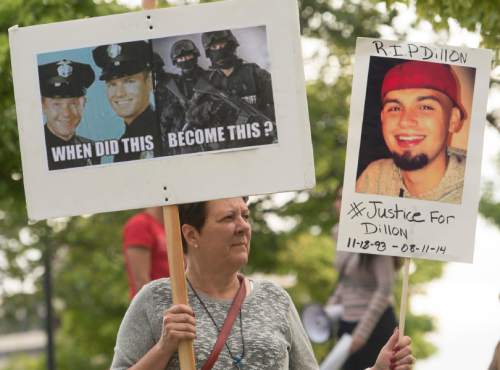This is an archived article that was published on sltrib.com in 2015, and information in the article may be outdated. It is provided only for personal research purposes and may not be reprinted.
"Exonerated."
That is the finding by the Salt Lake City Police Civilian Review Board in the Aug. 11 shooting death of Dillon Taylor, 20, by Officer Bron Cruz in the parking lot of a convenience store near 2100 S. State.
In something of an about-face, Salt Lake City on Tuesday publicly released the Oct. 17 finding after previously insisting the report was private, essentially based on the claim that it was a personnel record.
City officials had already made public the board's report of the officer-involved shooting of a dog named Geist last summer, saying they had exercised their discretion to release a private record. They offered no explanation of the different handling of the Civilian Review Board reports in the two cases, and the Salt Lake Tribune had appealed the open-records request denial to the State Records Committee.
But Tuesday, a spokesman for Mayor Ralph Becker said all Police Civilian Review Board reports will now be public unless there are extenuating circumstances. Details of the new policy are expected to be released Wednesday.
Taylor was not armed when he was killed. But minutes before the shooting, a 911 caller told a police dispatcher there was a man with a gun at the 7-Eleven store at 2102 S. State.
The civilian review panel found that Cruz feared for his life and therefore was within police policy guidelines to use lethal force.
Taylor had his hands in his baggy sweatpants, leading Cruz to believe he had a gun, according to the report released to the Tribune. The shooting was recorded on the officer's body camera.
District Attorney Sim Gill had earlier found that Cruz was not in violation of police policy when he killed Taylor because the officer feared for his life and Gill had publicly released many of the details of the investigation.
According to the Civilian Review Board report, Cruz saw three men in the store parking lot. He could see the hands of two men but Taylor's hands were not visible as he turned and began walking away from Cruz.
Cruz ordered Taylor to stop and remove his hands. Taylor took several more steps and then stopped and turned toward the officer. Taylor pulled his hands out of his pants and raised his shirt when he was shot.
"From the officer's point of view, he believed one of the three was reportedly armed," the report stated. "And when first contact is made, one of the three began to walk away from the scene."
Rocky Anderson, who as mayor of Salt Lake City was instrumental in instituting the Civilian Review Board, said its finding in the Taylor case is "utterly outrageous."
"That means that nobody is safe on the streets," Anderson said. "Police don't even have to see a gun before they shoot someone dead."
Anderson said his review of the police video — which was previously released — shows Taylor was doing what the officer ordered. "He was attempting to lift his shirt to show he didn't have a gun."
The former mayor, who is now in private practice as an attorney, is representing Sean Kendall, the owner of Geist, the 2-year-old Weimaraner that was shot to death in Kendall's fenced backyard in June.
At the time, police were searching for a missing toddler. When Detective Brett Olsen entered the yard, the dog became aggressive and Olsen feared for his safety, according to his report. The Civilian Review Board found that Olsen was within police policy by using deadly force.
Salt Lake City voluntarily made public the board's report on the dog shooting Aug. 1
According to the mission statement posted on its website, the Civilian Review Board "is critical in ensuring police accountability, as well as protection for police who have been falsely accused. It will, in the long run, promote greater trust between the police department and the community it serves."
The board is made up of Salt Lake City residents who volunteer for the position. They are not trained in law enforcement. The board receives legal advice from the city attorney's office, and the board's administrator and investigator answer to the mayor.
In the case of Geist, Anderson said the panel got improper legal advice from the city attorney's office. He has filed, on behalf of Kendall, a notice of intent to sue the city. Anderson added the Civilian Review Board should have a legal adviser outside the city attorney's office to ensure its independence.





